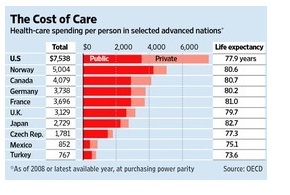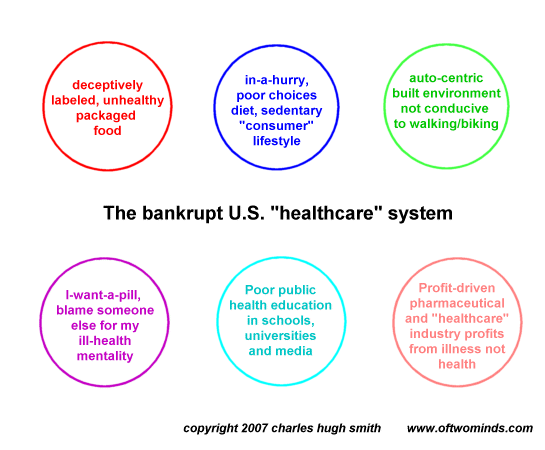There is no one solution to something as complex and costly as healthcare; the solution is to let 100 solutions blossom and compete openly for citizens' money and trust.
I have addressed the systemic ills of U.S. healthcare, a.k.a. sickcare, for many years, most recently in ObamaCare: The Neutron Bomb That Will Decimate Employment (February 22, 2013). Over the years, I have presented a number of options to the present unsustainable, fraud-ridden, costs-twice-as-much-per-person-as-other-nations system that ObamaCare leaves intact:
Nobody likes any of the practical solutions because everyone wants unlimited care and unlimited choice. Expectations in a system where the government can just borrow another $1+ trillion to pay the bills are high, and the feedback from reality, i.e. price, has been eliminated in the cartel/fiefdom system that is sickcare.
Everyone talks about "reform," but real reform is impossible in a bought-and-paid-for "democracy" like ours: Why Reform Won't Work (February 7, 2013).
Even more profoundly, the Central State and ObamaCare are the wrong unit sizeto provide healthcare that is transparently priced, accountable to the consumer, adaptable and decentralized.
 We are so brainwashed by centralized models of authority ruled by the State that few can even imagine a system where the solution is not one centralized monstrosity ruled by a political/financial Aristocracy but a competing profusion of opt-in, transparent solutions.
We are so brainwashed by centralized models of authority ruled by the State that few can even imagine a system where the solution is not one centralized monstrosity ruled by a political/financial Aristocracy but a competing profusion of opt-in, transparent solutions.
Rather than have a single system, we need dozens of choices.
If there is a political desire for a national prevention-only system of clinics, then fine, let the State offer this, but with two stipulations:
1. It is voluntary/opt-in; nobody need participate if they choose not to
2. there is a cash co-pay for every service, medication, test. etc. Nothing is free, because nothing is free. What is presented as free is abused and squandered.
If a national superstore chain opens clinics that accept only cash, great. If employers want to offer healthcare insurance, fine; if they don't, that's also fine.
If some insurance companies want to offer medical insurance, fine. The only requirement is that the fees and coverage must be transparent enough and clear enough to fit on one piece of paper.
Every service offered by either the State or a private insurer or provider must be transparently priced on the web.
If the Central State does offer healthcare of any sort, it cannot be open-ended, because the funding is not open-ended. It must be strictly limited, either in what is offered or in the sum of money that can be spent on any citizen/patient.
You see the guiding principle here: patients are given the costs, the limits and the choices. There are often hard choices to be made, and rather than empower a State-run cartel/fiefdom system to make those choices, let each citizen make their own choices.
If a person wants to spend more than the sum allotted by the State or insurance, then they are free to spend their own money or appeal to charity.
There is no one solution to something as complex and costly as healthcare; the solution is to let 100 solutions blossom and compete openly for citizens' money and trust. If there is a political will for some sort of State-operated healthcare, then it must contain limits on the sum that will be spent per person and the care that is offered, and it must enable transparent pricing, wide-open competition and patient choice.
Perhaps cities want to offer some sort of public care; it's the choice of the city's voters and taxpayers. Maybe local private clinics want to offer their own limited form of insurance; they should be free to do so.
Centralized, top-down systems are quickly shorn of innovation and cost control as the political and financial Aristocracy soon capture the regulatory and governance machinery for their own benefit.
As I noted in The Pareto Economy (February 18, 2013), 80% of the benefits could be reaped for 20% of the money squandered on our corrupt, fraudulent, ossified centralized systems.
We suffer from a systemic failure of imagination. This is a theme I have explored many times:
Our Dust Bowl Economy (November 20, 2012)
When the present path cannot possibly lead to success, regardless of the labor and treasure poured into the effort, then risking the unknown by trying something different is the only way forward.
Things are falling apart--that is obvious. But why are they falling apart? The reasons are complex and global. Our economy and society have structural problems that cannot be solved by adding debt to debt. We are becoming poorer, not just from financial over-reach, but from fundamental forces that are not easy to identify or understand. We will cover the five core reasons why things are falling apart:
 1. Debt and financialization
1. Debt and financialization
2. Crony capitalism and the elimination of accountability
3. Diminishing returns
4. Centralization
5. Technological, financial and demographic changes in our economy
Complex systems weakened by diminishing returns collapse under their own weight and are replaced by systems that are simpler, faster and affordable. If we cling to the old ways, our system will disintegrate. If we want sustainable prosperity rather than collapse, we must embrace a new model that is Decentralized, Adaptive, Transparent and Accountable (DATA).
We are not powerless. Not accepting responsibility and being powerless are two sides of the same coin: once we accept responsibility, we become powerful.
Kindle edition: $9.95 print edition: $24 on Amazon.com
To receive a 20% discount on the print edition: $19.20 (retail $24), follow the link, open a Createspace account and enter discount code SJRGPLAB. (This is the only way I can offer a discount.)
| Thank you, David P. ($25), for yet another wondrously generous contribution to this site -- I am greatly honored by your steadfast support and readership. | | Thank you, John F. ($5/month), for your splendidly generous re-subscription to this site --I am greatly honored by your steadfast support and readership. |


 1. Debt and financialization
1. Debt and financialization


























